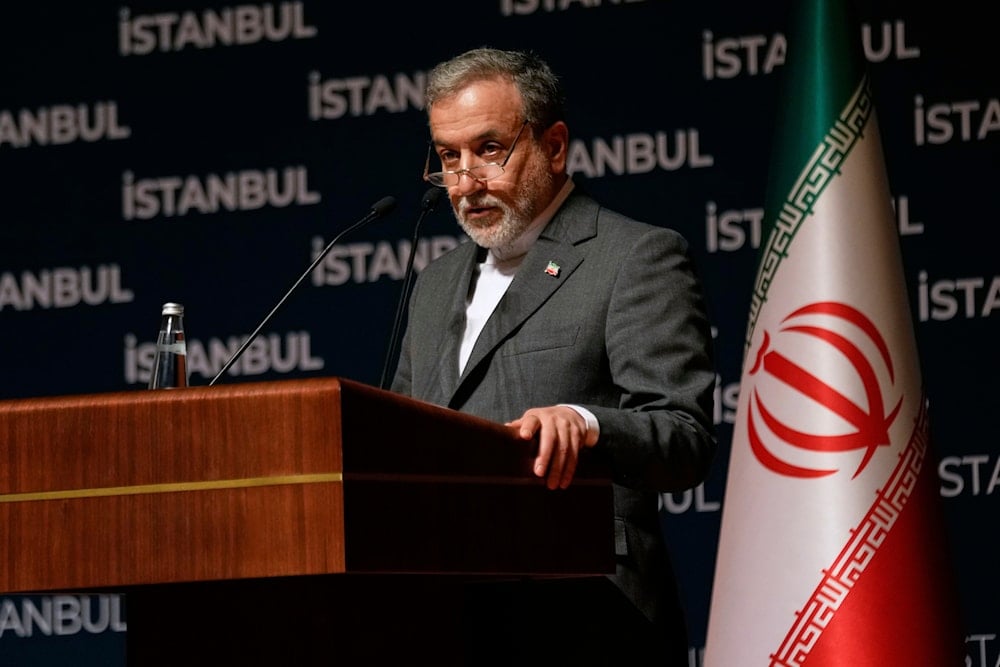Araghchi outlines post-war nuclear diplomacy, warns against sanctions
Iranian FM Abbas Araghchi details Tehran’s post-war nuclear stance, missile responses, and warns Europe against snapback sanctions.
-

Iranian Foreign Minister Abbas Araghchi attends a news conference in Istanbul, Turkey, on June 22, 2025. (AP Photo/Khalil Hamra)
In a televised interview with Iranian broadcaster SNN TV, Iranian Foreign Minister Abbas Araghchi asserted that both the United States and "Israel" had mobilized their nuclear capabilities and coercive strategies to force Iran into submission, but ultimately failed.
Araghchi praised the Iranian people’s steadfastness, describing it as a “historic symbol of resistance” during a critical national moment, emphasizing that despite years of sanctions, threats, and failed negotiations, the Iranian nation remained united in defense of its nuclear rights.
“Neither pressure nor diplomacy deprived us of our legitimate rights,” Araghchi declared.
The minister criticized US President Donald Trump’s "maximum pressure" campaign, describing it as marked by mixed messages, threats coupled with calls for dialogue.
While Iran rejected direct talks with Washington, Araghchi noted that Tehran was considering indirect negotiations under new conditions. After diplomatic efforts failed to impose US terms, Araghchi accused Washington of unleashing "the Zionist enemy to commit hostile acts," which he described as a betrayal of diplomacy.
Addressing Iran's retaliatory actions, he stated that Tehran’s missile attacks on US bases were a direct response to American threats and aggression, clarifying that no agreement had been reached to initiate new talks and that the outbreak of war had undermined Iran’s readiness to propose a balanced negotiation framework.
He revealed that this framework rested on three pillars: the continuation of uranium enrichment within Iran, the complete removal of sanctions, and a firm commitment not to pursue nuclear weapons.
“If these three conditions are met, an agreement is possible,” he said.
Iran’s response to military strikes and diplomatic breakdown
In his interview, Araghchi stressed that diplomacy following the recent war would differ sharply from previous efforts, warning that "Future international relations will reflect how each country behaved during the crisis."
He noted that the Atomic Energy Organization of Iran (AEOI) is currently conducting technical assessments of damage caused by the strikes, describing them as “serious and extensive.” Meanwhile, Iran's Foreign Ministry has tasked its international affairs division with identifying the aggressors and seeking compensation through the United Nations.
“Reparations are now a key component of Iranian diplomacy,” he added.
The minister urged European countries, particularly Germany and France, to uphold their stated commitment to international law, issuing a stark warning to France and the UK, both permanent members of the UN Security Council, against triggering the snapback mechanism that would reinstate UN sanctions on Iran.
He labeled such a move as “the most dangerous strategic error Europe could make,” warning that it would exclude them from any meaningful role in Iran’s nuclear dossier.
“Military strikes and snapback sanctions won’t weaken Iran—they will eliminate Europe’s place at the table,” he asserted.
No plans to host IAEA chief amid inspection concerns
The foreign minister confirmed that Iran currently has no plans to host IAEA Director Rafael Grossi, noting that the issue of inspector access is under careful legal and political review.
“With some facilities damaged, inspections could inadvertently reveal sensitive details about the extent of destruction,” he said, emphasizing that all decisions must comply with recent legislation passed by Iran’s Parliament.

 3 Min Read
3 Min Read










